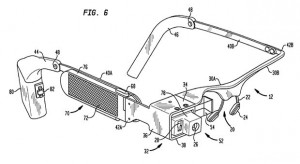 Let me start by being perfectly clear. I don’t have Google Glass. I’ve never seen a pair live. I’ve never held or used the device. So basically, I just have strong opinions based on what I have read and seen. And, of course, the way I have understood what I have read and seen. Sergei Brin recently did a TED talk about Google Glass during which, after sharing a glitzy, well-produced video commercial for the product, he maintained that they developed Google Glass because burying your head in a smartphone was rude and anti-social. Presumably staring off into the projected images produced by Google Glass but still avoiding eye-contact and real human interaction is somehow less rude and less anti-social. But let that alone for now.
Let me start by being perfectly clear. I don’t have Google Glass. I’ve never seen a pair live. I’ve never held or used the device. So basically, I just have strong opinions based on what I have read and seen. And, of course, the way I have understood what I have read and seen. Sergei Brin recently did a TED talk about Google Glass during which, after sharing a glitzy, well-produced video commercial for the product, he maintained that they developed Google Glass because burying your head in a smartphone was rude and anti-social. Presumably staring off into the projected images produced by Google Glass but still avoiding eye-contact and real human interaction is somehow less rude and less anti-social. But let that alone for now.
The “what’s in it for me” of Google Glass is the illusion of intelligence (or at least the ability to instantly access facts), Internet-based real-time social sharing, real-time scrapbooking and interactive memo taking amongst other Dick Tracy-like functions.
What’s in it for Google is obvious. At its heart, Google is an advertising company – well – more of an advertising distribution company. They are a platform for serving up advertisements for all manner of products and services. Their ads are more valuable if they can directly target people with ads for products or services at a time and place when the confluence of the advertisement and the reality yield a situation in which the person is almost compelled to purchase what is on offer because it is exactly what they want when they want it. This level of targeting is enhanced when they know what you like (Google+, Google Photos (formerly Picasa)), how much money you have (Google Wallet), where you are (Android), what you already have (Google Shopping), what you may be thinking (GMail), who you are with (Android) and what your friends and neighbors have and think (all of the aforementioned). Google Glass, by recording location data, images, registering your likes and other purchases can work to build and enhance such a personal database. Even if you choose to anonymize yourself and force Google to de-personalize your data, their guesses may be less accurate but they will still know about you as a demographic group (male, aged 30-34, lives in zip code 95123, etc.) and perhaps general information based on your locale and places you visit and where you might be at any time. So, I immediately see the value of Google Glass for Google and Google’s advertising customers but see less value in its everyday use by ordinary folks unless they seek to be perceived as cold, anti-social savants who may possibly be on the Autistic Spectrum.
I don’t want to predict that Google Glass will be a marketplace disaster but the value statement for it appears to be limited. A lot of the capabilities touted for it are already on your smartphone or soon to be released for it. There is talk of image scanning applications that immediately bring up information about whatever it is that you’re looking at. Well, Google’s own Goggles is an existing platform for that and it works on a standard mobile phone. In fact, all of the applications touted thus far for Google Glass rely on some sort of visual analysis or geolocation-based look-up that is equally applicable to anything with a camera. It seems to me that the “gotta have the latest gadget” gang will flock to Google Glass as they always do to these devices but appealing to the general public may be a more difficult task. Who really wants to wear their phone on their face? If the benefit of Google Glass is its wearability then maybe Apple’s much-rumored iWatch is a less intrusive and less nerdy looking alternative. Maybe Apple still better understands what people really want when it comes to mobile connectivity.
Ultimately, Google Glass may be a blockbuster hit or just an interesting (but expensive) experiment. We’ll find out by the end of the year.
